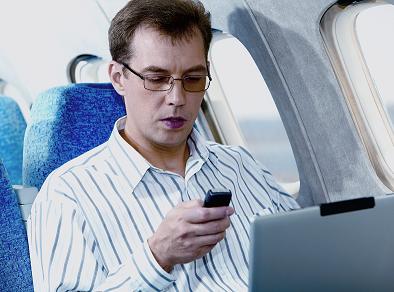Why switch off mobile phones in flights?
Oct 11, 2019, 11 33 | Updated: Oct 11, 2019, 11 33
Does keeping your cell phone, laptop or Kindle ‘on’ really impact the plane's radio and electronics systems? It's debatable.
Pretty soon, we’ll be in the midst of what marketers like to call ‘the holiday season,’ and for many of us, that means travelling to see friends and family. At its best, travelling on a major airline is just tolerable. At its worst, it's one of the most miserable experiences imaginable -- a descent into a hell filled with long lines, lost luggage, bad food, cancelled flights, howling children and invasive security measures.
And once you're packed into your tiny airplane seat, you have to suffer one last inconvenience: "Please turn off all electronic devices during takeoff."
It’s a fact of life for anyone boarding a plane; all electronic devices need to be turned off during take-off and landing. Most airlines have had this rule in place for more than a decade now, even though there has been no definitive documented instance in which passengers leaving their devices on caused a plane crash. So why are we forced to stop listening to music or doing the crossword electronically, during take-off and landing? Does keeping your cell phone, laptop or Kindle on really impact the plane's radio and electronics systems? That's debatable.
According to a report by The Wall Street Journal earlier this year, there's no firm scientific evidence that having gadgets powered up for takeoff and landing can cause a problem. Only that there's the potential for a problem.
The US Federal Aviation Administration allows pilots to use iPads and other electronic devices to replace charts and manuals in the cockpit, powered up during takeoff and landing. But the FAA says it can't test all the different gadgets passengers may bring on board. The agency worries a multitude of devices could pose more danger than a single iPad for pilots.
But if there is no solid scientific data to back it up, why worry about a theoretical problem, right? The FAA states that there are still unknowns about the radio signals that portable electronic devices and cell phones give off. These signals, especially in large quantities and emitted over a long time, may unintentionally affect aircraft communications, navigation, flight control and electronic equipment.
Lets try to understand this in a simpler way: If you have a cell phone and you go near a computer while sending a text message or receiving one, you see waves going across the screen. Why? Because the waves the cell phone emits is picked up by the computer and interferes with the display.
The same is the case with plane radars and other navigational displays. And that is why passengers are required to turn off cellular phones before going on a plane. Better safe than sorry, as they always say.







